Harvey Mudd Watson Fellows
Thomas J. Watson Fellowship was established in memory of the founder of IBM and is available to graduating seniors at 40 private colleges and universities across the U.S. The fellowships have allowed nearly 3,000 young men and women to “test their aspirations and abilities, view their lives and American society in greater perspective and, develop a more informed sense of international concern.”
Harvey Mudd College nominated its first students for the fellowship in 1976 and has had one or more students selected for the honor nearly every year since. Here are the College’s Watson Fellows, beginning with the most recent. Information was compiled from interviews, news stories and Mudd Magazine Magazine articles.
Sidney Taylor ’23: How Art Builds Community, How Communities Build Art
How Art Builds Community, How Communities Build Art
Canada, Spain, The United Kingdom, Australia, Taiwan.
How can large scale art involve the public? What types of creative environments empower communities? On my year, I will work alongside artists and engineers to discover how they ignite civic imagination through large scale, public art creation.
Kaitlyn Paulsen ’22: Caring over Curing: Endurance through Challenging Health Experiences
Caring over Curing: Endurance through Challenging Health Experiences
Australia, France, Japan, New Zealand and the United Kingdom.
April 20, 2022 HMC news story, HMC Watson Fellow to Study Empathy
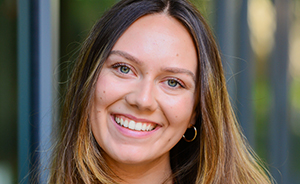
Not only is empathy one of her own core values, Kaitlyn Paulsen ’22 believes that empathy unites everyone. As a recipient of a 2022 Watson Fellowship, she looks forward to developing deeper empathy while investigating “Caring over Curing: Endurance through Challenging Health Experiences” during travel to Australia, France, Japan, New Zealand and the United Kingdom.
The Thomas J. Watson Fellowship is a one-year grant ($36,000) for purposeful, independent exploration outside the United States awarded to graduating seniors. Paulsen is part of the 54th Class of Thomas J. Watson Fellows, who represent 21 states and eight countries and exhibit a broad range of academic specialties, socio-economic backgrounds and project diversity.
Paulsen was encouraged by her research advisor and mentor, engineering professor Lori Bassman, to apply for the fellowship. In addition to engineering, Paulsen is majoring in human-centered design, which has allowed her to work on open-ended design projects, like one with the Brain Tumor Network, a nonprofit organization and free patient navigation resource for those impacted by brain tumors. One of the caregivers she interviewed had a 22-year-old daughter who had been diagnosed with a brain tumor. “Hearing him speak about his daughter is something I will never forget. He spoke about his desire to create memories with her in the time she had left,” says Paulsen. “The situation was unimaginable, and here he was, open hearted, sharing his pain, blessing us with his tears. I realized that the pain had nothing to do with the cancer itself. He wasn’t fighting the tumor in the way the doctors were. He was battling the idea that he could live a day in this world with his daughter not in it.
“Since that project, my passion for understanding emotional endurance in healthcare has only grown,” she says. Further interviews led her to surmise that often the medical field can be focused on curing instead of caring. “In a disease where a cure may not be possible, sometimes all we can do is care. This is the idea I decided to explore for my Watson project: what it means to focus on caring instead of curing.”
Paulsen plans to explore countries that have different approaches to healthcare, identifying programs that seem to focus on the emotional well-being of patients. In each country, she’ll shadow workers in various programs, interview patients, families and caregivers, and support the development of more holistic and inclusive models of care.
Paulsen says there are many dimensions to explore in this space of emotional endurance and shared some of what she’ll be investigating.
- The impact on caregivers and families.Caregivers bear both the emotional and practical challenges of caretaking. Particularly in degenerative diseases, caregivers can experience a preemptive grieving process.
- Expectations around emotional support in healthcare. What factors shape expectations around receiving emotional support? Is emotional support and connection present in the care environment? What barriers might there be to adopting these programs in different settings? How do expectations around emotional support change across the treatment continuum? “I’m curious how cultural definitions of health care shape these expectations,” she says.
- Resources that exist for provider well-being. What level of professionalism are clinicians expected to maintain? How does this level of professionalism affect stress levels and compassion fatigue?
“One reason this project means so much to me is because of the personal challenge and growth I hope to experience by conducting this project in an immersive way,” Paulsen says. “By positioning myself in a variety of emotionally and geographically foreign experiences, I want to not only explore what emotional resilience is for patients and providers, but what it is to me. I am eager to challenge my own ability to speak this language and develop deep empathy.”
Paulsen works at the Rick and Susan Sontag Center for Collaborative Creativity (The Hive) as a student staff member, helping refine curriculum for the human-centered design major and directing a podcast about the design process. At HMC, she’s served as a grader, teaching assistant and Academic Excellence tutor in the engineering department and as a tour guide for admission. She has participated in the Clinic Program, serving on teams to develop a less-traumatic nasopharyngeal swab and designing a more comfortable urinary catheter for the City of Hope. And, she’s worked in Professor Bassman’s materials engineering lab on research utilizing thermodynamic modeling software to study a system of high entropy alloys and bronzes.
Paulsen anticipates beginning travel for the Watson Fellowship soon after graduation.
Abel Sapirstein ’21: Alternate Perspectives in Healthcare Equity
Alternate Perspectives: In Healthcare Equity
Bhutan, Chile and Japan.
April 21, 2021 HMC news story, Sapirstein Wins Watson Fellowship
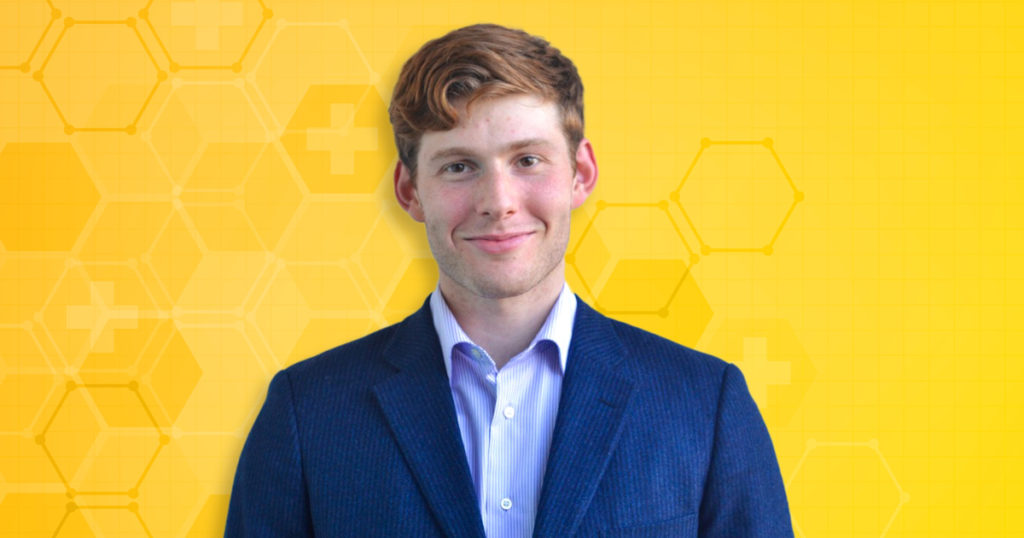
One of this year’s prestigious Thomas J. Watson Fellowships has been awarded to Harvey Mudd College senior Abel Sapirstein. The mathematical and computational biology major will study alternate perspectives in healthcare equity while traveling to Bhutan, Chile and Japan.
The 2021 class of Watson Fellows represents eight countries and 22 U.S. states. From the 153 finalists nominated to compete on the national level, 42 Fellows were selected from 41 institutions. Fellows receive a $36,000 stipend for 12 months of travel and college loan assistance as needed. They will travel to 77 countries exploring topics ranging from marginalized languages to community healthcare, from food sovereignty to Black women’s liberation through art, from computer science education to underground music production.
“I will be shadowing community physicians and interviewing community members to gain insight into how different nations have generated novel solutions to healthcare inequity,” says Sapirstein, whose winning project is titled, “Past, Present and Future Alternatives in Health Equity,” He has strategically selected locations where he can observe healthcare systems, culture and politics to gain insight that may lead to solutions related to healthcare equity.
Sapirstein will visit Chile to study the impact its history of centralized and decentralized healthcare has had on the country. While he considers Chile’s current healthcare system to be fairly equitable, Sapirstein is interested in interacting with people who have lived through the shifts in healthcare structure and gaining insight about the positives and negatives of this system.
He also intends to study in Bhutan, which has integrated traditional medicine and Western medicine into its healthcare system. Sapirstein says this practice seems to have yielded good mental healthcare and patient satisfaction.
He selected Japan due to its changing demographics and what other countries may learn from its people. He says, “Japan suffers from the problems that the rest of the world will soon suffer from—a health infrastructure that was designed for a population much bigger than the current population.”
Growing up in Baltimore, Maryland, Sapirstein witnessed inequality and systemic racism and how this plays a role in life expectancy, job opportunities and health in the U.S. It inspired him to study inequity in healthcare on a global scale.
“I believe access to healthcare is a prerequisite for a just society,” Sapirstein says. “I wonder how we can say that we live in a society predicated upon equality if I can expect to have a life that is 20% longer than my neighbor simply because of my ability to access healthcare.”
He says data-driven policy and resource allocation could unlock solutions to healthcare inequity, especially in countries where fewer financial resources are available. Sapirstein notes that major corporations, when financially driven, can deliver rapid solutions to consumers, though this tactic is not as common in the healthcare industry.
Sapirstein believes math could be a critical in finding a solution to healthcare equity. He plans to defer his Watson Fellowship for one year to enter a PhD program at Georgia Tech, where he will continue his studies in operations research.
Victoria Marino ’20: International Workouts
Beyond the Playground: International Workouts
Colombia, Chile, India, Egypt and China
APRIL 16, 2020 HMC news story, Marino wins Watson Fellowship
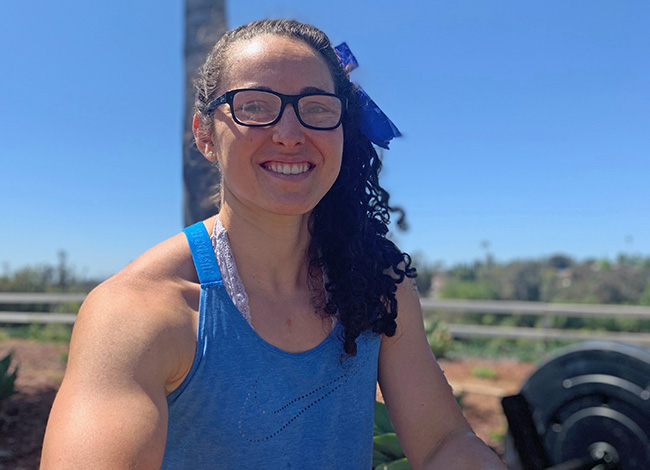
Workouts build more than muscle, they’re also helpful for managing stress, overcoming mental and physical barriers and, for Harvey Mudd College engineering major Victoria Marino ’20, being the best version of herself. A Watson Fellowship will allow Marino to explore “Beyond the Playground: International Workouts.” As a 2020 Watson Fellow, she receives a $36,000 stipend to pursue “a year of unparalleled international discovery.” She plans to travel to Colombia, Chile, India, Egypt and China.
Beginning in August (and based on international travel conditions), Marino will immerse herself in gyms around the world with a main focus on playground-style gyms. “I will spend my time working out with calisthenic workout groups across different cultures and communities to explore how working out provides a physical, mental and emotional release and challenge myself to gain a better, global and empathetic understanding of others.”
An engineering major and first-generation college student, Marino transferred to Harvey Mudd from Palomar College, a community college in San Marcos, California. In addition to working out regularly at HMC, she became the athletics director for the Associated Students of Harvey Mudd College (ASHMC) and worked with Division of Student Affairs staff and fellow students to improve athletic resources and equipment. Her academic work includes participating in a 2018 health hackathon in New York, where she and fellow team members brainstormed, planned and built a prototype of an at-home EEG kit for infants. To prepare for medical school, she has done research at Johns Hopkins School of Medicine (genetics lab), Cornell-Rockefeller-Sloan Kettering (neurobiological lab) and in HMC engineering professor Elizabeth Orwin’s lab (bioengineering) as part of the Engman Fellowship Program.
Her Watson year precedes her entry to medical school at University of Illinois at Chicago College of Medicine in the Innovation of Medicine track and Medical Scientist Training Program. She sees the fellowship as preparation for participation in Doctors Without Borders. “I want to grow a more diverse and global perspective through travel and experiences around the world to be able to most effectively use my position to better treat and serve patients, abroad and within the United States.”
Marino says, “My goal is to immerse myself in new experiences through the commonality of the gym to gain emotional growth and a more global perspective to make me a better sister, daughter and future physician-scientist.”
Among 40 participating institutions, 153 finalists were nominated for the 2020 Watson Fellowship to compete on the national level, and 47 fellows were selected. Harvey Mudd College nominated its first students for the fellowship in 1976 and has had one or more students selected for the honor nearly every year since. Lori Bassman, professor of engineering, is the Watson Fellowship program advisor.
Lam Huynh ’18:Vietnamese Diaspora– Counterspace Through Dance
Vietnamese Diaspora: Counterspace Through Dance
France, Germany, Netherlands, Japan, South Korea, Vietnam and Australia
May 10, 2018 HMC news story, Huynh Wins Watson Fellowship
One of this year’s prestigious Thomas J. Watson Fellowships has been awarded to Harvey Mudd College senior Lam Huynh. The engineering major will study the healing properties of dance in his project, “Vietnamese Diaspora: Counterspace Through Dance,” which focuses on the culture of Vietnam War refugees’ descendants.
This year’s class of Watson Fellows represents eight countries and 17 U.S. states and 40 participating institutions. From the 152 finalists nominated to compete on the national level, 40 Fellows were selected. Fellows will receive $30,000 for 12 months of travel and college loan assistance as needed. They’ll travel to 67 countries exploring topics ranging from foster care to opera to human augmentation to spoken word.
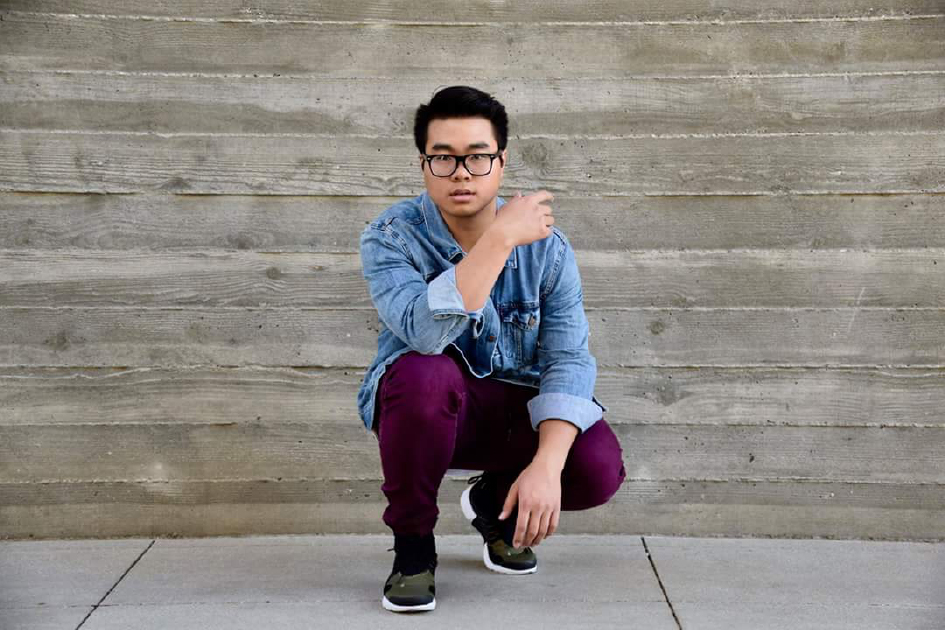
“I will explore how intergenerational trauma has turned the second generation of overseas Vietnamese toward dance,” Huynh says, “especially the styles of hip-hop, street and urban dance. I hope to gain deeper insights on how these dance styles form communities that go beyond just emotional outlets to become ‘counterspaces’—spaces that are liberating and healing to the self and the community.”
Inspired by his lived experience as a second-generation Việt Kiều (overseas Vietnamese, living outside of Vietnam), Huynh will study the Vietnamese diaspora—which spans the world—in France, Germany, Netherlands, Japan, South Korea, Vietnam and Australia. Having come from a family of South Vietnamese refugees, Huynh was raised with this history and cultural heritage. He’s also a dancer.
“In being part of the dance community, I started to notice how a lot of Vietnamese Americans participated in the scene,” he says. “I felt that a lot of Vietnamese youth danced not just because it was fun, but because there was an emotional need that necessitated it. As I reflected on my own reasons to dance, I felt that this emotional need was unpacking the intergenerational trauma that was passed down to the second generation from the Vietnam War.”
Huynh has a seemingly endless list of questions he hopes to answer with his research, including examining how the Vietnamese experience in other countries compares to the Vietnamese-American experience. He also hopes to learn how the people of the Vietnamese diaspora are connected and suspects he may find answers in dance, specifically hip-hop, street and urban dance.
“Dance isn’t just simply a performing art,” Huynh says. “Rather, it is an artistic medium that actively builds bridges and forms relationships between people. I want to explore what other diasporic Vietnamese communities are like; I want to explore what other dance communities are like. I want to see if I can find myself in communities around the world.”
Huynh’s summer 2018 Harvey Mudd College Magazine story
Dina Sinclair ’17: High School Math Contests
High School Math Contests: Gender, Culture and Access
Brazil, Argentina, Senegal, China, Japan, Finland, Bulgaria
Alumni update, Department of Mathematics Newsletter 2018
Dina Sinclair ’17: This past year, I’ve been on a Thomas Watson Fellowship, traveling to Brazil, Argentina, Senegal, Singapore and England to look at how cultural and logistical aspects of math contests affect which students choose to participate in them. I’ve found math contests mixed with poetry, newspaper comic sections, sprinting and graphic design, among other cool combinations. I’d love to talk to anyone who knows of innovative math contests, has math contest experiences/ideas or just wants to hear more about my experiences from this year!
April 14, 2017 HMC news story, Sinclair to Study Math Contests With Watson Fellowship
Math contests can encourage, inspire and challenge students, but to whom do they appeal and why? Harvey Mudd College senior Dina Sinclair will use her Thomas J. Watson Fellowship to travel the world seeking answers to these questions.
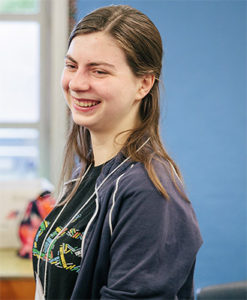
Sinclair is one of 40 Watson Fellows selected from a group of 149 finalists nominated by 40 participating institutions. This year’s class of Fellows comes from 21 states and six countries and exhibits a broad range of academic specialty, socio-economic background and life experience. As the 49th class of Watson Fellows, they’ll traverse 67 countries exploring a variety of topics, including pediatric cancer treatment, citizen journalism, animation, autonomous vehicles, immigration, megacities and wildfire management. All fellows receive a $30,000 stipend.
Sinclair, a mathematics major and 2016 Goldwater Scholarship recipient, plans to begin her fellowship research in Brazil this July at the International Math Olympiad. She will look at math culture in different countries, using high school math contests as a gauge. “I’m curious what kinds of cultural and logistical choices communities can make while hosting math contests that make those contests more accessible to a wide group of students, especially women,” she says. “I’m planning on spending my time at math contests and in math classrooms, talking to students, teachers, and contest writers and organizers.”
From Brazil, she’ll head to Argentina and Senegal, then to China, Japan, Finland and Romania. “These places have a really wide variety of math cultures and histories, and a wide range of female participation in math contests. I’m really excited to see what kinds of differences between these countries I’ll find.”
Sinclair has been interested in math and math culture since grade school. “I did a lot of math contests in high school. In some, I was the only girl around, while in others I was part of an all-girl team. I could never quite put my finger on why some contests attracted girls while others didn’t, and it’s something I’ve kept thinking about throughout college.”
Last summer, Sinclair worked with Professor of Mathematics Rachel Levy doing math education research, including working with teachers in the Pomona School District on math modeling in their classrooms. Sinclair and Levy also traveled to South Korea to teach an engineering math course. “Traveling to Korea was a great way to see math education in a different culture, and helping local teachers teach math modeling instilled my desire to think not only about the content we teach in the classroom but the culture and norms behind that content that foster or inhibit learning,” Sinclair says.
The fellowship will no doubt provide Sinclair with great opportunities as well as challenges, and she looks forward to both. “I’m really excited to immerse myself in new cultures. It’ll be hard sometimes to find connections and a place to live in countries where I don’t speak the language, but I’m looking forward to that challenge,” she says. “I’m really excited to learn from math communities across the world and better understand how high school math culture impacts students. Hopefully, I’ll be able to bring some of that knowledge home with me and implement positive change within my own mathematics communities.”
Natasha Allen ’16: The Pursuit of Universal Access to Energy
Switching On: The Pursuit of Universal Access to Energy
Cambodia, Uganda, Ethiopia
Fall 2018 interview for Harvey Mudd College Magazine (fall/winter issue)
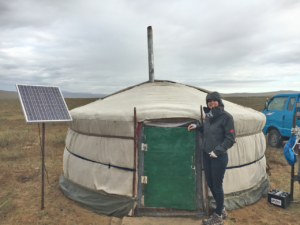
My Watson project focused on grassroots approaches to rural electrification and took me to Cambodia, Myanmar, Tanzania and Uganda. Since first working on energy access issues in high school, I have constantly been challenged by and interested in how communities can have greater ownership and control over their energy use and I set out on my Watson to explore this question. On that journey, my most memorable moments were those that I spent with the communities I hoped to learn from. One of my favorite memories was when I was meeting with rural electricians in the Southeast of Myanmar and found that a large number of households in a village had solar systems in their homes that weren’t working. The electricians and I spent some time together troubleshooting to find that there was an issue with the charge controller system. Together we were able to fix the systems in the village using just a piece of old wire. Those kind of moments characterized by co-learning, problem solving and hunching over solar electric systems were the highlights of my year.
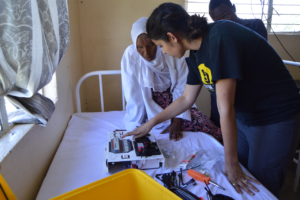
While meeting with rural electricians in Myanmar, I learnt that there was an impressive number of villages that built their own village-level electricity systems (“mini-grids”) which they operate and maintain independent of government support. Inspired by those electricians, I am now living in Myanmar and starting my own social enterprise that provides training and access to finance for these electricians (called “meesayar” in Burmese) to improve their businesses and provide better quality electricity to their communities.
Outside of my career, my Watson year had profound impacts on how I see and understand myself. My experiences, good and bad, showed me how resilient I truly am and helped me to build a lot of trust in myself to take risks and try new things (like starting a business!). I now have a better sense of how to healthily push myself, when to call in for help, and how to be more compassionate with myself when things don’t work as well as I would have hoped. I feel ready to move forward in my life with faith in myself and a strong sense of purpose.
HMC news story, Allen Awarded Watson Fellowship, April 2016
Priya Donti ’15: Smart Grids
Smart Grids: Policies, People, and a New Pulse
Germany, India, South Korea, Chile, Japan
Fall 2018 interview for Harvey Mudd College Magazine (fall/winter issue)
Tell me a little about your experience.
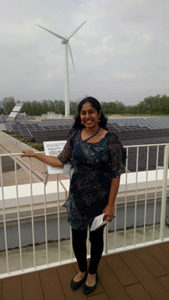
During my Watson year (2015–2016), I traveled to five different countries (Germany, India, South Korea, Japan, and Chile) to explore the people and policies behind next-generation electric power systems. I spent about two to three months in each country interviewing individuals working in this space about the interconnections between the social, technical, and political aspects of power systems in their countries, as well as the broader directions in which they saw power systems evolving. It was really inspiring to hear from so many different people about this topic and its interconnections to important areas of work such as climate change and economic development.
What location, activity or person(s) were most memorable?
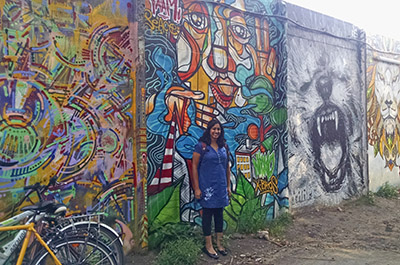
It’s so hard to pick! One experience that really stuck with me was visiting the city of Kumamoto in Japan relatively shortly after a large earthquake there in April 2016. I had been thinking a lot about resilient electricity infrastructure in the context of all the natural disasters that Japan faces, but what really struck me in Kumamoto was the resilience of the people. When I was walking around, I saw community. I saw volunteers in the city center serving food. I saw trash trucks from other cities including Kyoto, sent by these other cities to help clean up. I saw temporary vendors in a main market, presumably set up there because their normal buildings were unfit for use. The result was a juxtaposition of permanent shops, closed-off buildings, and stalls with cardboard boxes piled behind them. In this market, I saw lots of people walking around, hanging out, shopping. They were smiling, socializing and coming together as a community. It was a city moving on and moving forward.
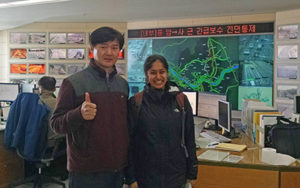
I also made so many amazing friendships along the way. On more than one occasion, folks went on daylong or multi-daylong road trips with me to interview people in farther-out parts of each country, and in general people poured a lot of their own personal time into my explorations. I am so very grateful for all the people without whose generosity my trip wouldn’t have been possible. I also met my current partner (of almost three years now) during the Watson Fellowship, so that was a huge surprise bonus!
What are you doing now?
I am now a PhD student in computer science and public policy at Carnegie Mellon University, working with Zico Kolter and Inês Azevedo at the intersection of deep learning and electric power systems.
How did your Watson project impact your life and/or career?
Through my Watson project, I learned about a lot of exciting directions for research in the power sector, some of which I’m working on now during my PhD. At a broader level, the Watson truly helped me understand the diversity of viewpoints that exists around the world, and made me someone who is much more independent and up for exploration than I was before the journey.
HMC news story, Two Seniors Earn Watson Fellowships, March 2015
Sophia Williams ’15: How Can We End Poverty?
Listening to Those Who Know: How Can We End Poverty?
Jordan, India, Kenya, Greece, Chile
Audio recording (MP3), Harvey Mudd Convocation, fall 2016, “Active Listening, A Scientific Pursuit” by Sophia Williams ’15 (Includes discussion of her Watson year)
HMC news story, Two Seniors Earn Watson Fellowships, March 2015
Christian Stevens ’14: Trust Between Marginalized Communities & Medicine
The Natural Attorneys of the Poor: Bridges of Trust between Marginalized Communities and Medicine
Malawi, China, The Republic of Congo, Russia
Fall 2018 interview for Harvey Mudd College Magazine (fall/winter issue)
Tell me a little about your experience.
For my project, I wanted to focus on the relationships between medical professionals and the communities they worked with. Often times, poor healthcare is not as result of a lack of effective treatments or therapies, but an inability to communicate with patients and build relationships. Many patients worldwide die of treatable and often even preventable diseases due to our failure to build trust in the medications they are given or the recommendations they receive from doctors. And it was this gap that I wanted to explore.
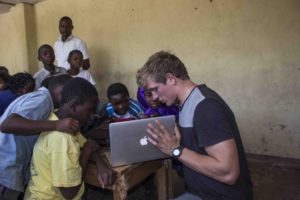
Each location I chose highlighted some form that I thought this sort of relationship might take. I worked in a rural Malawian clinic where healthcare was provided by nuns without an extensive medical education, but who did come from the community. I also worked with western physicians from Baylor Pediatric Institute who worked in Mwanza, Tanzania. In South Africa I explored post-apartheid relationships between wealthier and, often, white doctors and their patients. In Hong Kong, I was most interested in the relationships built between often xenophobic physicians and an increasingly immigrant population. In Siberia I shadowed physicians and nurses who worked with prisoners and former prisoners with tuberculosis. And in Romania I had the chance to work with an infectious disease specialist who had worked with the same cohort of patients since they were children diagnosed with HIV in the early ’90s. In each of these places, the power dynamics changed and so did the skills required to navigate the relationships.
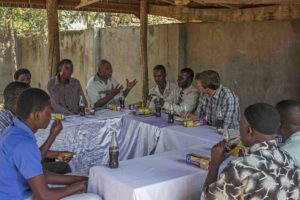
In the 365 days that I was outside the United States I learned a great deal about relationships between healthcare providers and communities. But I also had a number of experiences I would never have expected that had nothing to do with medicine. I met people I still talk to today, from all over the world and made some very close friends. I spent at least a day in 14 different countries and at least a month in six (Malawi, South Africa, Tanzania, China, Russia, Romania). I don’t think I’ll ever experience anything like it again.
What location, activity or person(s) were most memorable?
I told the story in my Convocation speech about seeing the infant who died. That was very early in my trip and stuck with me. In fact, it stuck with me enough that on my very last day on the trip I was in Bucharest, Romania. A doctor, Dr. Oprea, who I had spent almost every day for the last 10 weeks with invited me over for dinner to celebrate going home. She is an MD/PhD who worked in infectious disease. Her work was very close to what I might envision myself doing some day. But she happened to become an pediatric infectious disease specialist in the late 1980s and early 1990s when HIV first came to Romania in a torrent. She worked with the first infants who got HIV from their mothers in Romania. Those children, the ones who survived, grew up because she spent the time fighting for their access to the few treatments that became available over time. She worked hard to make sure they had the best care, despite most of them being among the very poorest in Bucharest. Today those “kids” are all my age and I was lucky enough to meet many of them. One of them had stopped taking his antiretrovirals because he had taken them all his life and couldn’t stand it another day. After some time he developed tuberculosis. When he finally came to Dr. Oprea, his tuberculosis was referred to as XDR-TB, extensively drug-resistant, meaning that few, if any, drugs could possibly treat it. He died while I worked with Dr. Oprea, not long before I had to leave.
When we were eating dinner on that last night I was asking Dr. Oprea so many questions because there were so many unanswered thoughts that had been bouncing around in my head the year. I told her the story of watching the infant die in Malawi and I told her the story of the physician in Malawi who burned out seeing those deaths. I asked Dr. Oprea how she not only did not burn out but in fact seemed to thrive when things got the most difficult. She had stuck with her patients as they got older and even got board certified in adult medicine so that once they became older she could remain their go-to physician. I asked her how you balance the pain of dealing with death and hardship every day, but don’t allow it to burn you out.
She told me that practicing the art of medicine requires you to neither burn out, nor become numb to the pain your patients feel. She told me that when a patient died, she did not try and put on a strong face and push through. Instead, every morning before she goes to work, she thinks through the patients she has lost. She describes all of those patients as being in the same cemetery, her cemetery. And every morning, in her mind, she puts flowers on each of their graves. And every day she goes to work for those of her patients still with her.
That description of hers stuck with me more than any single other thing on my trip. She intentionally made herself as vulnerable as possible because she felt that it made her stronger. She made sure she never blocked anything out, but she also ensured she never dwelled too long on what was the past. She acknowledged it, accepted it, and it made her stronger. This advice she gave me was by far the most memorable thing I got from that year.
What are you doing now?
I am currently an MD/PhD student at the Mount Sinai School of Medicine. I finished my first two years of medical school, and now I am beginning the PhD phase of the program. I am working in the lab of Benhur Lee where we do work with a number of species of viruses. My project is a mix of basic science virology and viral engineering.
How did your Watson project impact your life and/or career?
My year as a Watson Fellow is what convinced me how important it was to practice medicine in service to the poorest and most marginalized communities around the world. It solidified in me the idea to apply to become an MD and a PhD in order to both work directly with patients as well as develop research that can leverage my clinical experience. My time as a Watson Fellow has also convinced me to strongly consider practicing medicine abroad at some point in my career, however it is unclear now exactly how I might try and make that work.
HMC news story, Christian Stevens ’14 Awarded Watson Fellowship, March 2014
Hannah Groshong ’13: Transition into Adulthood for Individuals with Special Needs
A New Routine: Exploring the Transition into Adulthood for Individuals with Special Needs
Japan, China, Jordan, Netherlands, Denmark, Germany
Fall 2018 interview for Harvey Mudd College Magazine (fall/winter issue)
Tell me a little about your experience.
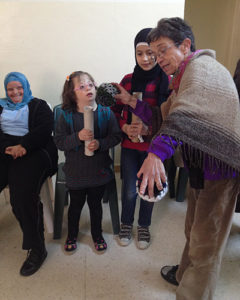
I traveled to Japan, Jordan, Germany, Denmark, and the U.K. to look at how each country provides for people with special needs, particularly in the transition into adulthood. Inspired by my younger sister, Bailey, who has Down Syndrome, I wanted to learn how people live, work, and play. I visited people in their homes, saw them at work in cafes and art studios, and busted a move or two with them in dance classes. I met so many incredible people and so appreciate the time I could spend immersed in their world.
What location, activity, person was the most memorable?
Jordan was the most memorable place for me. Not only is it absolutely beautiful and full of history, but Jordan is where I met my dear friend Veronika. Veronika was originally from Germany, but had spent the last 20+ years in Jordan caring for people with special needs. Every Saturday, Veronika and I drove to a small village outside Amman and met a group of moms and daughters at a tiny community center. Veronika had a collection of balls made out of yarn, paper towel rolls, anything she could find to engage the girls and have some fun. We sang songs, practiced counting, and laughed together. It was a time for the girls to have fun with their friends and be stimulated learning new things. After saying goodbye to the sweet girls, we always stopped in on Veronika’s friends nearby, who were blind. She brought them falafel and fruits/veggies and we sat and chatted, sitting on cushions on the floor. Veronika’s loyal friendship and practical care for people was hugely inspiring to me. Veronika passed away a year or so after I left Jordan and I so cherish the time I was able to spend with her.
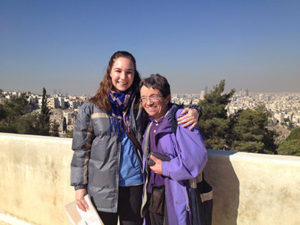
What are you doing now?
I work for a small firm (Spy Pond Partners, LLC) that does management consulting for transportation agencies. We work with the State Departments of Transportation (DOTs) all over the country and also do quite a bit of research. I’ve primarily been involved with asset management related work, helping DOTs improve their business processes and allocate resources effectively to maintain their pavements and bridges in good condition. I am learning a lot and really appreciate the practical nature of the job. I get to play a small in role in helping DOTs improve their processes on the strategic level, so that hopefully that pothole you always hit ultimately gets fixed.
How did your Watson impact your life and/or your career?
My Watson year hugely impacted both my life and my career. The year allowed me the opportunity to delve into my sister’s world and think about her needs and her future. I came back with a better understanding of my role in her future and the ways I can support her in all that she does. The perspective I gained from the year is definitely invaluable.
But, I also might not be working in transportation if it wasn’t for the Watson! I went to Japan and totally fell in love with trains. (I mean, how can you not nerd-out over trains when riding the Shinkansen!?) This new interest led me to do research in freight rail automation systems in grad school, which then led me to the company I work for now. While at Mudd, I never would have imagined this is what I would be doing five years later.
HMC news story, Watson Fellows to Study Solar Power, Special Needs, April 2013
Dustin Zubke ’13: Solar Power Across Cultures
Chasing the Sun: Solar Power Across Cultures
Germany, Spain, Australia, China, India
HMC news story, Watson Fellows to Study Solar Power, Special Needs, April 2013
Veerasak Srisuknimit ’12: Connections Among Unicycling, Cultures and Science
Where is the Other Half? Exploring the Connections among Unicycling, Cultures and Science
Italy, Ghana, India, Brazil, Japan
Fall 2018 interview for Harvey Mudd College Magazine (fall/winter issue)
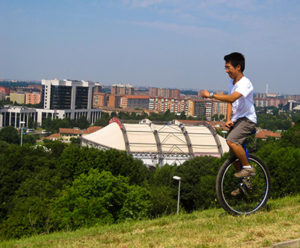
Tell me a little about your experience.
I spent a year traveling with my unicycle and experiencing unicycling cultures around the world. I went to what is basically a unicycling olympic in Italy and took part in a 100-km relay race. With five unicycles, I started a unicycling club at a school in Ghana. I tried to learn skateboard tricks for unicycling in Brazil but failed miserably. I trained with a team of children in Japan where we performed figure skating on unicycles.
What location, activity, person was the most memorable?
I find my time in Japan to be most memorable. I have always wanted to go to Japan since I was little. The seas and mountains are beautiful. The foods are delicious. My young teammates were very kind to me even though we only communicated via Google Translate.
What are you doing now?
I am currently finishing a PhD in chemistry at Harvard University. My research focuses on studying the enzyme that allows MRSA to become antibiotic-resistant superbug.
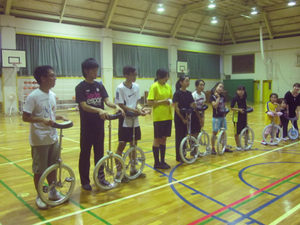
How did your Watson impact your life and/or your career?
My Watson year inspires me to enjoy teaching something fun and exciting even if it is a difficult subject to teach. I find that teaching someone to ride a unicycle is often a lot more challenging than teaching organic chemistry. Both are equally fun and exciting, of course.
Robert Best ’10: Eco-Cities & Sustainability Across Cultures
Visions of Green: Eco-Cities and Sustainability Across Cultures
China, United Arab Emirates, Kenya, England, Ireland
Fall 2018 interview for Harvey Mudd College Magazine (fall/winter issue)
Tell me a little about your experience.
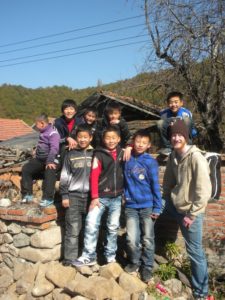
The Watson was both the most incredible and one of the most challenging things I have ever done. I remember on my first day, I landed in Shanghai, China, walked around unable to read a single street sign, and wondered what I was even doing there. From that moment, the whole year was packed with navigating new cultures and languages while learning to network and find connections that enabled my personal investigation. My project was exploring the definition of eco-cities, the practices that were being developed, and the role of local culture in defining what a sustainable city meant. I got to visit a lot of project sites, meet a number of architects, engineers and locals, and immerse myself in truly understanding the history and culture of each country. I visited China, India, the United Arab Emirates, England and Germany in my trip, originally because each had developed model eco-cities that were meant to be sustainable utopian visions of the future. Throughout my journey, however, I became increasingly interested in the cities that were not these “model” cities, but had evolved organically to incorporate sustainable practices, buildings, and policies. Getting to know Shanghai, London, Dubai, Delhi, and Freiburg intimately became the best part of my experience. I spent a lot of time interacting with locals, learning about the history of each place, and talking with practitioners, drawing direct lines between the culture and history and how the city was evolving today. What I learned has certainly strongly shaped the way I view cities and sustainable development today.
What location, activity or person(s) were most memorable?
One of the most memorable stops of my trip was Huangbaiyu, China. Huangbaiyu was a model eco-village designed by an American architect in a rural setting north of Beijing. Though intended to be three development phases, after the first 40 or so houses and a school were built, the project was abandoned. Despite the ecological credentials of the project, it didn’t match at all the residents’ desires or needs; yards left no room for chickens and livestock, and the houses didn’t match the cultural principles with which traditional Chinese homes are designed. Today, all but one house stand empty, and the village looks apocalyptic. Rusting grain silos, a school with broken windows, and eerily still yet intact houses give the impression of a town abandoned after a disease or famine. It is a haunting reminder of the need to create in each place a definition of sustainable that encompasses the social and cultural as well as the ecological.
What are you doing now?
Currently, I work at Arup, a global engineering consulting firm, advising cities, universities, and private sector clients on pathways to reduce energy and water use and lower their carbon footprint. This ranges from advising on renewable energy strategies and procurement to detailed building energy modeling and optimization to data-driven policy analysis and development of carbon reduction pathways.
How did your Watson project impact your life and/or career?
I can definitely draw a direct line from my Watson project to where I am now. Mudd gave me an excellent background in engineering and humanities, and provided me opportunities through the Lewis Fellowship and Clinic to nurture my interest in green building and sustainable city development. But it was the Watson that really let me explore the frontier of eco-city planning and the challenges with sustainable design in different cultures. It solidified my interest in solving the intertwined technological and cultural challenges of sustainable urban development, and drove the research I undertook in grad school using computational tools to model environmental and social outcomes of urban planning and energy policy. Today, that same interest is what drives my current work on energy and climate action for cities and projects here and abroad. And on a more personal note, I met my wife while on my Watson—we were staying at the same hostel in Berlin, stayed in touch, moved to San Francisco at the same time, eventually started dating, and were married in July 2017!
Richard Horn ’09: Twinkle Twinkle Little Star
Twinkle Twinkle Little Star: How We Wonder What You Are
Australia, China, Sweden, Namibia, Chile, Peru
HMC news story, March 2009, Brandon Horn ’09 Awarded Watson Fellowship
Harvey Mudd College (HMC) student Brandon Horn ’09 has been awarded the prestigious Thomas J. Watson Fellowship for one year of independent study abroad after graduation, it was announced recently.
Horn, a native of Ocala, Fla., was awarded the fellowship based on his project, “Twinkle Twinkle Little Star: How We Wonder What You Are,” and will travel for 12 calendar months during 2009-10 to Australia, China, Sweden, Namibia, Chile and Peru. The Watson fellowship includes a $25,000 stipend for expenses during the year.
Horn describes his project in this way: “In my Watson year I will see how our cultural and scientific backgrounds influence our perceptions of the cosmos. I will use telescopes to bridge cultural divides and learn about people’s traditional cosmologies, while allowing the people I meet a glimpse of the universe I know and love. In this, I will come to understand the factors that influence what we think of when we look up at night.”
“I have wanted to be an astronomer since I was in middle school,” Horn explained. “I will be bringing along the telescope my parents bought me when I was 13, as well as approximately 100 Galileoscopes, which I will give to interested people. The Galileoscope is a telescope that costs less than $15 and is slightly larger than the telescope that Galileo used to discover the moons of Jupiter, sunspots, the phases of Venus and craters on the moon 400 years ago.”
“Since it is the 400th anniversary of Galileo’s discoveries, the astronomy community is celebrating the International Year of Astronomy (IYA),” Horn said. “This includes star parties and more public nights at observatories around the world, as well as other events particular to each country. The IYA provides a useful way for me to keep up on astronomy events in each country I am visiting, but obviously I cannot count on there being a star party every night.”
Horn plans to visit public parks, where he will set up his telescope and invite passers-by to look through it. “This will hopefully act as a catalyst and spark up a conversation about the universe,” he said. “I would like to get people to draw maps of how they see the universe, and also learn how important they feel understanding the rest of the universe is.
“In observing these ethnoastronomies, I am not searching for cultural novelties to be used in lecture hall anecdotes, but rather am searching for the effect our cosmologies have on our philosophies and lifestyles, so that I can create a bridge across cultures and effectively communicate about astronomy with people who do not necessarily share my background. The telescopes will be my window into other cultures’ universes.”
A physics major, Horn plans to pursue his PhD in astrophysics after his Watson year, and spent time during spring break in March visiting graduate schools.
“The Watson is not just a year of travel in between Harvey Mudd and graduate school for me—it is part of my plan to change the world,” Horn wrote in his proposal to the Watson Foundation. “I want to inspire the next generation of scientists, just as Carl Sagan inspired me, and I feel that taking a year to see what astronomy means to people around the world will allow me to reach more people more effectively.”
In his letter of nomination of Horn, HMC’s Louisa and Robert Miller Professor of Humanities Hal Barron, who coordinates the Watson Fellowship nomination process on campus, wrote: “Brandon Horn invokes Anaximenes’ query of Pythagoras (‘Why should I trouble myself in searching out the secrets of the stars, having death or slavery continuously in front of me?’) as he tries to understand and justify his own attraction to astronomy. His Watson project will enable him to search out the secrets of the people watching the stars as well as those of the stars themselves, and will help him deepen his own answers to Anaximenes’ question. In the end, this will only make him a better scientist. The Watson Fellowship will allow him to broaden his technical and scientific focus and to explore the different meanings of the stars in a variety of social and cultural contexts.”
Horn credits many of the faculty at HMC and The Claremont Colleges for enriching his appreciation for astronomy: “In addition to all the astronomy classes I’ve taken, Science Technology and Society—taught by Prof. [Marianne] De Laet—played a critical role in the formation of this project, and she helped me in fleshing out the proposal. I look forward to working with her professional friends in some of the countries I will be visiting. I would also like to thank Prof. [Ann] Esin at Mudd, and Prof. [Philip] Choi at Pomona [College], for being excellent astronomy teachers and encouraging me along the way.”
In a letter to HMC President Maria Klawe, Watson Foundation Director Cleveland Johnson explained that this year’s fellowship awards were unusually competitive due to the nation’s sagging economy: “Typically, from the almost 200 inspiring nominations we receive from our affiliated institutions, we are able to offer 50 fellowships and five alternate positions. Due to considerable endowment contraction, we are saddened this year to announce that we will be only able to offer 40 awards (and no alternates). The elimination of 10 fellowship slots has made this year’s competition especially fierce.”
The mission of the Thomas J. Watson Fellowship Program is to offer college graduates of unusual promise a year of independent, purposeful exploration and travel outside of the United States in order to enhance their capacity for resourcefulness, imagination, openness and leadership and to foster their humane and effective participation in the world community.
Nikolas Sherrow-Groves ’08: Impact of Structural Failure in Earthquake-Prone Countries
The Impact of Structural Failure in Earthquake-Prone Countries
Japan, El Salvador, Peru, India
HMC news story, April 2008, Sherrow-Groves Earns Watson Fellowship
Nick Sherrow-Groves, a Harvey Mudd College senior, has been awarded the prestigious Watson Fellowship for one year of independent exploration and travel outside of the United States.
Set to graduate on May 18, 2008, with a bachelor’s degree in engineering, Sherrow-Groves earned the travel grant with his proposal, “The Impact of Structural Failure in Earthquake-Prone Countries.” He will be traveling to Japan, El Salvador, Peru and India starting this summer.
“Nick is committed to a career in civil engineering,” said Hal Barron, professor of history at HMC and liaison to the Watson Foundation for the application process. “For his Watson project he plans to look at both the technical and non-technical aspects of the interface between engineering and the threat of earthquakes in order to understand the successes and the failures that different societies have experienced. He hopes to use this year to get outside of his engineering ‘box’ and learn more about the human dimensions of the work he plans to devote his life to.”
“I hope to get an understanding of what my work as a structural engineer will mean to the world,” added Sherrow-Groves.
The Thomas J. Watson Fellowship Program (http://www.watsonfellowship.org) was established in 1968 by the family of the late founder of International Business Machines Corp (IBM).
Regarding its investment in people as an effective contribution to the global community, the Watson Foundation awards $25,000 fellowships each year to 50 superb college seniors from around the world. In return, recipients—chosen from nominations made by their college–agree to remain outside of the United States and actively engaged in their project for 12 months.
Chosen from a pool of 175 finalists who competed on the national level, Sherrow-Groves will begin his travel in July.
“I will spend most of my work time networking, trying to make contact with people who have survived these disasters,” he said. “Interspersed in this will be interviews with government officials and engineers. I would also like to visit the locations at which major earthquakes have occurred.”
International travel is hardly foreign to this Washington State native, who spent a semester abroad at Oxford University (after which he traveled on his own for three weeks) and has seen a good part of Europe with his family.
The living situation is a bit disconcerting for him, however.
“I’ve actually never gotten a room for a long-term stay in my life,” said Sherrow-Groves, who plans to attend graduate school when he returns from his fellowship. “I’ve always lived in a dorm or at my parents’ house. Finding an apartment or some kind of home-stay in an entirely foreign country will be an experience, especially in Japan and Gujarat, India, where I don’t speak the language.”
But he’s looking forward to it all.
“I really hope that the Watson fellowship will change my life,” Sherrow-Groves said.
Stephanie Moyerman ’06: Judo– The Gentle Way of Exploring Cultural Differences
Judo: The Gentle Way of Exploring Cultural Differences
Israel, Russia, Japan
Gwen Spencer ’05: Gender of Science and Technology in Emerging Economies
Reinterpreting the Gender of Science and Technology in Emerging Economies
Tanzania, Swaziland, Kenya, India, Ireland
Fall 2018 interview for Harvey Mudd College Magazine (fall/winter issue)
Tell me a little about your experience.
Life at Mudd was like a technical fire hose, or like a series of back to back marathons, which I often loved. As I wrote my Watson proposal as a senior, I knew that I had spent a lot of time (joyously!) parsing formal details, but that I had done less work towards our motto of attaining a, “clear understanding of the impact of [our] work on society.” Yet, I knew that scientific enterprises were more subjective, emotional, and value-laden than we often acknowledged. That insight came squarely from “The Social Life of Technical Objects,” a terrific course taught by Professor Marianne de Laet (Mudd). The other huge influence on my proposal was a course taught at Scripps by a visiting scholar from Botswana, Professor Musa Dube (now of the University of Botswana). I initially enrolled in “Feminist Intro to the Bible” to meet a troublesome distribution requirement, but it shaped my perspective deeply. I left that course believing that, in understanding a person’s experience, there is no greater expert than the individual herself (or himself).
My Watson project was titled, “Reinterpreting the Gender of Science and Technology in Emerging Economies.” Over the course of the year, I conducted more than 50 personal interviews with female scientists and engineers in Tanzania, Swaziland, South Africa, India and Ireland. At that time, these were countries where there was at least some national rhetoric that science could play a critical role in the growth of the economy. At the same time, varying by country, there were some strong traditional obstacles to women’s education (sometimes specific to STEM, but not always). I included countries where I was able to find some advance evidence that national need had the potential to broaden participation by women. Sometimes I would find government initiatives, while in other places I talked with women involved in self-organized advocacy (at institutional, national and international scales), or simply women who had navigated scientific careers.
Before I left on my travels, the after-hours reception for new Watson Fellows at Huntington Gardens was like a dream: the graceful manicured lawn stretched away from the warmth and bustle of a grand terrace lit by Christmas lights. I had written my proposal like a term paper, lovingly composing it and stitching it together, fussing over it until the themes were rising and falling exactly according to my design. I had never traveled independently before, nor visited a country where the amount of money in my pocket might be an average family’s income for a year. Waking up in West Africa a few weeks later to start organizing myself for a whole year was quite a cold shower! Watson is a master class in, “Plan to re-plan,” and I discovered very quickly that signals I had detected on the internet from Claremont had about a 30% chance of corresponding to a real opportunity to talk to someone. For example, I learned that if you want to meet someone, it is worth allocating a day to just go to where you expect to find them, and then to loiter until you encounter them by chance. Both flattered and startled by the appearance of a stranger from California, your intended interview subject may then feel obligated to add you to their calendar!
What location, activity or person(s) were most memorable?
There were numerous deeply affecting moments, both explicitly related to my project, and simple facts of traveling as a young single American woman.
I vividly remember many situations where I suddenly became deeply aware of both my tremendous ignorance of world history and the incredible privilege I had already experienced in pursuing my studies. One of my very first and generous contacts was Professor Verdiana G. Masanja (then University of Dar es Dar es Salaam, now the Nelson Mandela African Institute of Science and Technology). As a math major myself, I showed up at Professor Masanja’s office ready to ask how she decided to study mathematics.
There had not, as it turns out, been a lot of deciding. The reason is that while Professor Masanja was in high school, native Tanzanians were still excluded from most national universities in Tanzania. At that time, mainland Tanzania had only recently gained independence from British colonial rule. After the Zanzibar Revolution in 1964, it was suddenly possible for Tanzanians to attend these universities. Well-prepared students had to be found quickly. Based on test scores, students were assigned to disciplines according to the perception of future national need. Mathematics and Physics were deemed to be the hardest subjects, so if you excelled at all in your exams, that is what was selected for you. Later, after her studies at TU Berlin, Professor Masanja became the first woman from Tanzania to receive a PhD in mathematics.
In addition to her research and teaching work, Professor Masanja was the National Coordinator for the Female Education in Mathematics and Science in Africa (FEMSA) initiative in Tanzania (funded through the Association for Development of Education in Africa, ADEA). In this capacity she headed a national team in developing individual school profiles and policy recommendations for the Tanzanian Ministry of Education. We met repeatedly during my time in Tanzania as my project was evolving to discuss the major obstacles currently facing girl students in mathematics and sciences in Tanzania, the cultural systems that operate around gender in the region including societal prejudices and expectations for women, the importance of basic development including the dismal rates of public education, the socio-political significance of financially independent women, and the politics of gender advocacy at the national level. Professor Masanja and several of her colleagues I met were in the first wave of Tanzanian women to go to university; they chose firmly to return to their own country and played a dramatic role in shaping the entire modern history of these issues in their lifetimes.
I repeatedly encountered stories that touched on similar themes. First, openly-stated exclusion from top institutions based on racist colonial legacies. After that, layers of discrimination, based both on sex and on the basis of race or caste. Second, highly-accomplished female scientists often faced a painful tradeoff: they often found that there was no one to do direct advocacy work but themselves. Professor Rohini Godbole, a particle physicist who is one of a handful of female members of the Indian Academy of Science asked me earnestly, “Shouldn’t there be someone else to do this work? Some experts in social science? What I love and trained in was Physics!” Despite the incredible loss of national human capital that occurs when a talented woman can’t obtain training in STEM or can’t gain access to positions where they can use that training, eminent scientists found that criticism of existing systems was usually completely dismissed unless it came from women working in science at the highest levels: then, they might have a chance. And so, Profesor Godbole had worked to use the professional influence she had in numerous initiatives and committees, reserving time away from her true technical intellectual passion. When I talked with Professor Lydia Makhubu, a Swazi chemist retiring from her role as the President of the Third World Organization for Women in Science, she told me that if she could start over, strategically she would completely skip over talking about equality of opportunity, and talk only about how national development suffers when a country ignores half of it’s technical talent pool. This, she said, was the only real way to get politicians to listen. Remarkably, Professor Makhubu was the first Swazi woman to earn a PhD.
What are you doing now?
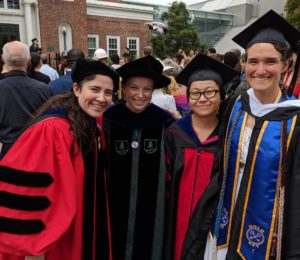
I’m on the faculty at Smith College (a women’s liberal arts college in New England) in Mathematics and Statistics. Since I arrived at Smith, I’ve taught math to about 400 students (the vast majority are women). I often teach our gateway major course (Discrete Mathematics) which is really fun: the material is so beautiful that it is easy to get students interested. I take a lot of inspiration great professors I had at Mudd.
I also have a broad research program that includes theory topics in Optimization, Algorithms and Graph Theory, as well as a range of applied projects that are often related to Network Science. In addition to the information on my academic website, I want to comment that one of my favorite parts of being a faculty member has been mentoring student research. For example, with my undergrad research collaborators I’ve recently worked on topics like designing viral spread in social networks, high-dimensional parameter fitting to understand the growth of drug-resistant Tuberculosis, and how to improve analysis pathways to increase reproducibility in computational neuroscience. I hope that I can pay forward some of the investments my undergrad research advisor (Francis Su!) made in me.
How did your Watson project impact your life and/or career?
It’s hard not to see some connections 🙂
Interestingly, among my major advisees, there is a dis-proportionally large number of international students. While these students sometimes blend in to “the masses,” occasionally I’m hit by how many layers of learning they are doing simultaneously. The Watson experience is part of what helps me be curious about where my students are coming from and how their hopes and dreams may depart from a fuzzy mental model I might hold as an American about what a prototypical student wants and should aspire to. At graduation, I frequently meet the families of these students. These families have often sent their daughters half-way around the world to study in a language that the parents can’t even speak. This is so brave, both on the part of the student and the parents. I find it deeply humbling to be trusted in this way and I take the opportunity very seriously.
Tara Martin ’04: Cultural Expression Through Movement
Finding the Inner Beat: Cultural Expression Through Movement
Brazil, Argentina, Cape Verde
Anne Short ’02: Living and Catching My Food
Living and Catching My Food
Kiribati, Nepal, Mali, Thailand, South Africa
Harvey Mudd College Bulletin (magazine), fall 2005, Alumni Profile: “Food for Thought and Action,” by Stephanie L. Graham
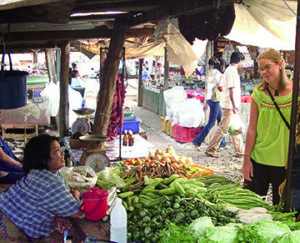
A pink, triple-decker peppermint angel food ice cream cake is an annual birthday treat for mathematics alumna Anne Short ’02. In her Thomas J. Watson personal statement, she described this and other food traditions as being important events in her life. Yet, she wrote, she was troubled by the disconnect she felt from the production of the food.
Such a dilemma appealed to the Watson Foundation administrators and they awarded her a fellowship in 2002 to conduct a year-long study on “Food Attitudes in Subsistence Communities,” which took her to the Republic of Kiribati, Nepal, Mali, Thailand, and South Africa. The foundation hopes that fellows will use their time abroad as a break from formal education and as an opportunity to explore their interests, test their aspirations and abilities, and view their lives and the United States from a new perspective.
Short spent her year living with locals, eating interesting food—millet with camel milk, crickets, cicadas, yak, and, her personal favorite, red ant eggs—and talking with people about food, their culture, and the changes they saw in local food production and consumption. Even though most of her prior arrangements fell through once she arrived at her destinations, she found living arrangements through tourist guide contacts, the Peace Corps and “chance, luck and learning whom to trust.” She presented herself as someone wanting to simply experience the culture, rather than as a tourist or researcher, and found that because of this, she was very well received. “The reaction I got was really amazing. So many people opened up their homes and lives to me,” she said. “What really stuck with me was the incredible power of family throughout the world, including people’s willingness to adopt me into their families completely, 100 percent treating me as if I was one of the family.”
She said this was particularly true in Kiribati, where she lived for three months. The family there now considers her one of them, and she still keeps in touch. She also lived with a nomad family in the Sahara desert and with another in Timbuktu, whose patriarch lamented the effect of television on his newly urbanized family. He told Short how his family now watched what was happening in the rest of the world instead of talking with each other about daily life.
She saw this as a good metaphor for the way she had been studying and it convinced her that instead of working abroad, she should work domestically, at least for the time being. She returned to the United States with a renewed commitment to studying food issues and agriculture systems, doing her master’s at U.C. Berkeley on urban food access, with a focus on an Oakland, Calif., neighborhood. Currently working on her PhD, Short’s work has taken on a science and technical aspect that she thinks her master’s work lacked. A part of the Energy and Resources Group at Berkeley, she will study land use change in California’s Central Valley, including the conversion of agricultural land to urban development and how this affects water quality and policy. She says she’s still in the very early stages of project formation but is looking for a project that will be meaningful to her and others.
The perspective she gained from her Watson travels, she believes, will help her to do to that.
Brooke Basinger ’01: International Concepts in Roller Coaster Design
International Concepts in Roller Coaster Design
England, Spain, Germany, Sweden, The Netherlands, Switzerland, Japan, Brazil, Mexico, India, Singapore, Thailand, Denmark
Fall 2018 interview for Harvey Mudd College Magazine (fall/winter issue)
I received a Watson Fellowship in 2001 to study International Concepts in Roller Coaster Design. I am a mechanical engineer by training and have always been particularly fascinated by mechanical interactions between the body and the machine. At the time, I found roller coasters to be a particularly unique and interesting design challenge – after all, where else is your design goal to scare the cr*p out of people without actually hurting them? I wanted to understand how different cultures and countries approached both designing and riding roller coasters and the Watson provided me an unparalleled opportunity to do that.
I have to admit that I applied for the Watson Fellowship as something of a lark without any real expectation that I would get it. I proposed that I should spend about six months in Europe shadowing various roller coaster design firms (many of whom I’d already emailed) and the remaining six months gallivanting around the world experiencing those firms’ roller coasters “in the wild”. To me, it seemed an outlandishly unrealistic opportunity to travel the world and indulge my engineering curiosity on a particularly fascinating topic at the same time. When I actually got the fellowship, the reality sunk in that I would be traveling the world for an entire year by myself without any sort of support structure or home base. It was a bit terrifying, but of course I wasn’t about to turn down such an outrageously fun opportunity at that point. So I packed up my bags and set off.
I stopped off in New York City to visit my brother for a week on my way out of the country and, among other things, had an amazing dinner at Windows on the World, the restaurant at the top of the World Trade Center where my brother’s friend’s father was the executive chef. This was in late July, 2001. I then took off for London on a flight piloted by my then-boyfriend’s father – he got me into a first class seat (still the only time I’ve ever flown first class!) and gave me a peek of the cockpit, where I got to look out on a pitch black Atlantic Ocean from the front window of a brand new 777. My year of adventures was off to a pretty fantastic start!
I spent the first couple weeks in the UK diving headfirst into my project. I went to amusement parks, county fairs and boardwalks where I would inevitably get a backstage tour from a park engineer. I learned a lot about the gritty logistics of running and maintaining a roller coaster during that first month. I also learned how to pretend I wasn’t feeling motion sick every time one of those engineers took me on their favorite spinny ride. (Roller coasters don’t make me sick, just spinny rides). I also talked my way into meeting with John Wardley (a leading UK roller coaster designer) at Alton Towers where I toured the early construction for their new flying coaster, Air, and learned how they used underground dig-outs to keep their Nemesis coaster under the tree line as required by their local zoning restrictions.
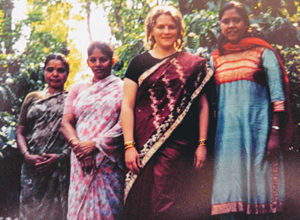
Although my first several weeks were ultra-productive, I very quickly started doubting myself. I was used to doing a good job on pretty much everything I touched, but in this context I had no idea what it even looked like to do a good job. There were no grades, no right answers, and no professor or boss to tell me what was expected of me. I didn’t know it at the time, but THIS was the real purpose of the Watson Fellowship. I eventually figured out that it was up to me to define my own path and my own metrics for success. I got to decide what it looked like to do “a good job”. I could define my own path, set my own goals, and make my own decisions. I struggled with lingering perfectionist angst for a lot of the year, but I also learned to trust my instincts, take risks, and adapt on the fly.
Adaptation became a particularly critical skill when, only six weeks into my fellowship, two planes hit the twin towers on September 11, 2001. My brother lived in New York, my boyfriend’s father flew long haul flights for United, and I had no internet connection. I was staying with a friend in Denmark and he kindly spent hours translating the news from Danish for me and got me into his office building in the middle of the night so I could get a good internet connection and get in touch with my loved ones. I had an amusement park appointment set up for the following day and, not knowing what else to do, I showed up for it. Life eventually went on, but being abroad during 9/11 and for almost a year afterwards gave me a fundamentally different experience than my entire peer group. There was an initial outpouring of support – strangers buying my tea or giving up their seat on a crowded train for me just because they heard my American accent and wanted to help however they could. But it shifted over time, first to deep late-night conversations in Spanish about American foreign policy and eventually to being accused of “killing Afghanistani babies” by random passersby in Morocco.
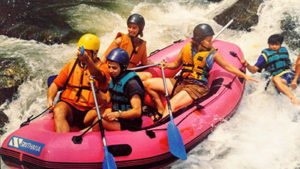
I ended up spending several months in Europe, where I learned German, dreadlocked my hair, and hosted my family for Christmas in Spain in that order. After meeting an Indian amusement park owner at a German roller coaster conference (yes, there are such things), I decided to tack on a spontaneous month in India. My dreadlocks were a big hit there, I became an expert haggler (I’m willing to make two stops at commission-paying souvenir shops along the way in exchange for a discount on my tuk tuk ride to the airport) and I tagged along on my friend’s family beach vacation to Goa (where I volunteered to teach her kids what a sunburn was – bad idea). I spent two months in Southeast Asia (slow boats down the Mekong river) and a month in Japan (bath houses, temples and baseball games) before heading to South America for three months (anaconda hunting [photos only] in the Amazon, hiking from Bolivia to Peru on the eve of a tense election, getting our truck stuck in the mud and having to ask the Paraguayan army if my 10 muddy friends could bunk on their floor overnight, and visiting a Mudder on her Peace Corps assignment in Guyana).
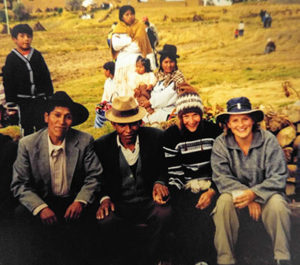
I did ride some roller coasters along the way but, as you can see, the things that really resonated with me were the people I met (including the many Mudders and semester-abroad-flatmates that I met up with along the way) and the completely unscripted, spontaneous experiences I had off the beaten path. In many ways, those life experiences are the real goal of the Watson Fellowship. The project you choose to pursue is just a vehicle to get you there.
By the end of my Watson, the world as we knew it had fundamentally changed and I had visited roughly 30 countries, circumnavigated the globe, taken hundreds of rolls of photos (before digital!), eaten plenty of things I couldn’t identify and had meaningful life conversations in languages I didn’t speak. Most importantly, I had developed the confidence that no matter what weird situation I ever find myself in, I can always trust myself to figure my way out of it.
I ended up more fascinated than ever about the mechanical interaction between the body and the machine, but on a much more micro scale. I got into medical device design, got a PhD working on implanted retinal prosthetics, and have been working my way through the medical device and biotech field ever since, first as an individual engineer and then as a manager and project lead. I’m currently the Head of Hardware Operations at Google’s biotech venture, Verily Life Sciences.
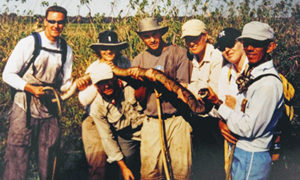
My Watson experience really laid the foundation for who I became as an adult and as a professional. I’m confident in my own ability to figure things out as I go and think my way through difficult situations, which makes me a lot more willing to take risks. I’ve ended up taking stretch assignments and jobs that are “too big for me” at every step in my career and, even though I haven’t known all of the answers along the way, much like the Watson I’ve been able to navigate my way through it, learn along the way, and eventually find a positive outcome that pays off for everyone. Perhaps most importantly though, I’ve been able to operate on the premise that I can define my own metrics for success. If something doesn’t look right or feel right to me, I can change it. Because ultimately I get to decide for myself what it looks like to do “a good job” in any given scenario.
Sarah Shapard Palmer ’99: Cultural Attitudes Toward Aging
Cultural Attitudes Toward Aging
Australia, England, India, Mexico, Tanzania
Ryan Arndt ’97: Exploring Traditional European Glass Blowing
Exploring Traditional European Glass Blowing
Czech Republic, Italy, Netherlands, Ireland, Hungary
Fall 2018 interview for Harvey Mudd College Magazine (fall/winter issue)
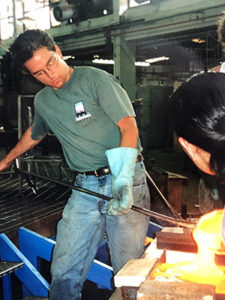
My path to the Watson Fellowship started early: as a maternity gift, my mom received a gift certificate for a glass blowing lesson when I turned 8 years old. (She was’t quite ready then, but when I was 10 she still had a the card and cashed it in!) I was raised on Whidbey Island (north of Seattle in the Puget Sound) and developed a close relationship with some of the local glass blowers. Throughout high school, I would hangout out at their studios and listen to their stories, do odd jobs, and help out with the actual glass blowing anytime I could. At Harvey Mudd and without much of a post-graduation plan, my girlfriend, having heard stories of the many characters I hung out with growing up, suggested I apply for the Watson Fellowship.
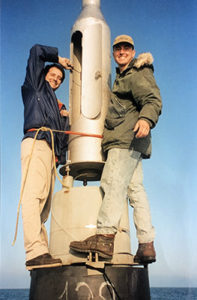
After writing a 10-page proposal and a three and a half hour interview, I had a check for $18,000. I was on my way to Italy, Ireland and the Czech Republic to explore the european cultures of glassblowing. I managed to squirm my way into a glass factory in Venice where I spent most of my year making glasses and chandeliers, (Actually, the factory was on Murano – back in the day it seemed safer than having them in the city and it made keeping the techniques secrete a little easier.) Toward the end of my year abroad I was invited to assist with a guest artist program at Waterford Crystal, in Ireland, and spent a month learning to cut crystal and making outlandish pieces of art: colorful vases, a full size crystal splitting maul and bowling ball.
While I haven’t done any glass blowing since my watson, the independence and exposure to different cultures had a profound impact. My wife and I are taking a sabbatical next year to travel with our two daughters (ages 11 and 8) in South America, Africa and Nepal!
Growing up in a tight-knit community on Whidbey Island allowed me to make connections with artists and Harvey Mudd alum (and former astronaut) Pinky Nelson ’72 which impacted my choice of college, led to the Watson, took me to Washington, DC where I did science and math education work for the AAAS at Project 2061 (Pinky was the director at the time), then returned to small town life in the NW where I settled down as a part time middle school teacher and have lots of time to play with my friends and family on the mountains and rivers of Oregon and Washington.
Khaldoun Shobaki ’96: Prospects for the Internet in the Middle East
Prospects for the Internet in the Middle East
United Arab Emirates, Jordan, Israel, Syria, Egypt, Kuwait, Saudi Arabia, Yemen, Oman
HMC interview with Khaldoun Shobaki by Stephanie L. Graham, Sept. 2001
What was the nature of your Watson project?
My project was “Prospects for the Internet in the Middle East.” I travelled to Jordan, Yemen, UAE, Oman, Kuwait, Egypt, Israel and Syria. This was in 1996, when the Internet was not the ubiquitous entity that it is now in everyone’s lives. I spent time in each country seeing what people were doing with the internet, who was bringing service into the country, what the government’s involvement was, etc.
What was discovered?
Well, I came out with a pretty good idea of what each of the various countries was doing with the Internet. In each country, there were different entities involved in bringing the connections in. Also, the government was/was not involved to quite a wide degree, which is surprising in the Middle East. Normally, the governments in those countries keep a tight hand on information.
Any interesting experiences that occurred in the fact-finding process?
The whole damned thing was an interesting experience! 😉 Well, I was picked up by a car full of Kuwaiti girls, visited the mosque in Hebron during riots there, worked as a consultant in Oman, and got giardia in Egypt. Met three other Watson fellows in the course of my travels, two in Israel and one in Egypt. In general, had a fabulous time.
What you are doing now and how has your Watson project affected your life and/or career.
Well, at some point after I got back to the states, I realized that I would have to get a job. Luckily, I found one while out playing soccer! Really! So, I’ve been working as a computer programmer (my degree is in biology) for the last 4 years, and now I’ve given up all of that glamour for a return to school. I’m studying law @ UCLA now. My Watson whetted my appetite for travel, something that I had lost touch with during high school and college. I grew up in Jordan, and used to travel in Europe a lot as a kid. Since my Watson, I have been on three trips out of the USA. Went to
the Alps for a month, also to Spain for a couple of weeks, then a month or so ago, I visited my sister in Mauritania (she just finished up in the Peace Corps). So, it really re-lit the travel bug in me. Also, I think that it’s made me want to do something in the international arena in the future.
William Washington ’95: Study of Fountains
Study of Fountains
Spain, Italy
Kimberly Cornett ’95: Engineering Aspect of Winemaking & Agriculture
Engineering Aspect of Winemaking & Agriculture
Germany, Italy, France, Israel
Web content, accessed November 2001: “Thomas J. Watson Fellowship Year 1995-1996”
“Certain events in your life really show you how lucky you are to be alive and to be able to enjoy the riches of this universe. From August of 1995 through August of 1996 I had one of these experiences. Over the course of 12 months, I was able to live in four different countries and travel to 13 countries through Europe and the Middle East.” —Kimberly Cornett
Matthew Summers ’94: Building Techniques & Urban Sprawl
The Evolving Household: Building Techniques & Urban Sprawl
Mexico, Costa Rica, Honduras
Fall 2018 interview for Harvey Mudd College Magazine (fall/winter issue)
Tell me a little about your experience.
I traveled in Mexico and Central America and looked at how squatter communities develop into formalized neighborhoods in major urban centers. It was super interesting and a totally different than my experience with civil engineering in the U.S. But most important, the experience allowed me to immerse myself in another culture and language and I learned a lot about myself and developed a new worldly outlook.
What location, activity or person(s) were most memorable?
I rented rooms from a people who were so hospitable and provided some of the best memories. The Dona I lived with in Tegucigalpa, Honduras had a parrot that learned my name and would call out to me just the way the Dona did. The parrot’s mimic was so perfect that every time I fell for it and answered!
What are you doing now?
I manage a renewable energy company that develops technology for conversion of waste materials into bioenergy and biofuels.
How did your Watson project impact your life and/or career?
My Watson year changed my world view by challenging my cultural biases and how I approach problems. My company works on an international basis, and I think I really try to understand the people I work with rather than pushing my view. It also gave me an interest in developing technology that benefits communities. Also, I have a great love of travel and I always try to rent in an Airbnb room from somebody rather than staying in a hotel. I find the experience so much more enriching to meet someone eager to share their home and their city or town. That definitely would not have happened without my Watson experience.
Kerim Aydin ’93: A Journey into Turkish Folklore
Tales from the Crossroads: A Journey into Turkish Folklore
Turkey
Ellen Liu ’92: Koto Music of Three Countries
Koto Music of Three Countries
China, Japan, Taiwan
1992 HMC Bulletin story, page 19: “Watson Fellowship Winner to Explore the Music and Lore of the Koto”
The Thomas J. Watson Foundation has awarded Ellen Liu ’92, an engineering major with a minor in music, a $13,000 fellowship to study koto music in China, Taiwan and Japan in 1992–1993. Liu is one of 70 fellowship winners from 53 colleges and universities throughout the United States.
“I’ll be learning the basics of playing the instrument,” said Liu. “I’ll also be learning the political and cultural influence of koto music and how different places have different interpretation fo the same compositions,” she said.
Originally developed in China over 4,000 years ago, the kotoi also became popular in Japan. The instrument comes in 18- and 13-string versions and two lengths.
In each country she visits, Liu will receive individual instruction from koto masters and perform research in archives. She will first spend four to five months attending the main music school in Taiwan and visiting university libraries. For an other four or five months, she will go to the two most important koto schools in China, and she hopes to visit a geisha house in Japan to observe how it is used in that setting.
Liu said she chose to study the koto “because it was an instrument I’ve been wanting to play since I was a kid [in Taiwan].”
The Watson Fellowships support college and university seniors for a year of independent study and travel outside the united States following graduation. Watson Fellows perform research in a field in which they demonstrate interest and leadership potential.
The foundation hopes that fellows will use their time abroad as a break from formal education and as an opportunity to explore their interests, test their aspirations and abilities, and view their lives and the United States from a new perspective.
“I think it will be a good experience. I will associate with different people and learn how to be on my own. I will learn how to adapt to different environments,” said Liu of the benefits she will gain from her time away from the United States.
Eric Prosser ’91: Traditional Brewing Techniques
Apprenticeship with European Breweries: Traditional Brewing Techniques
Great Britain, Germany, Czechoslovakia
Paul Hagelin ’91: Robotic Engineering
Robotic Engineering: Social Impact & Industrial Applications
Germany, Austria, Switzerland, Denmark
Douglas Dunston ’90: Trumpetmaking
Trumpetmaking
Germany, Austria, Italy, Switzerland
Fall 2018 interview for Harvey Mudd College Magazine (fall/winter issue)
Tell me a little about your experience.
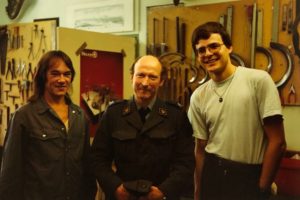
The principal subject of my Watson Fellowship was the one-year “apprentice” trumpet making position I had with Rainer Egger, a second-generation instrument maker in Basel, Switzerland. Rainer’s shop specialized in making baroque-replica brass instruments from scratch…and by “from scratch,” I mean the instrument bells were fabricated out of sheets of brass!
(Photo 1 has the master instrument maker Rainer Egger in the center, returning from his required national service, and two of the journeyman instrument makers I worked with at his sides. Bruno, on the left, was a quiet worker, and Christian on the right, was loud, colorful, and taught me what little I now know of Swiss German.)
For the time I was in Basel, I stayed with a group of international students from around the world who were attending the University of Basel. The unifying factor for all of us was that German was a second (or third, or fourth, for some) language, so we spent our time together inventing our own dialect (easy enough in Switzerland, with its impenetrable local versions) and creating our own mashups of world culture, such as a multilingual, multicultural blues band to play at parties.
What location, activity or person(s) were most memorable?
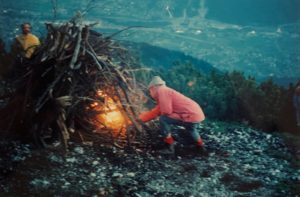
So much of the Watson experience is in a not-straight-line, with plans turning into surprising adventures. I had originally planned to wrap up my time in Basel with a trek hut-to-hut across the Austrian Alps, but late snows and closed huts forced me to turn around and retreat back to Switzerland. On my last day before turning around, I had made it to the only nearby hut on the Alpine trail that was open, one at relatively low altitude. It was summer solstice.
Early-afternoon, dozens of people from the town below started hiking up the paths to the Alpine hut where I was. They were all dressed casually (one playing a guitar as he walked up), and they brought food and warm clothing with them. On our low-level peak, as the sun went down, the adults sent the children to fetch kindling and firewood, and a couple folks started constructing a large bonfire. There was singing and laughter, and I think I counted 40 types of homemade schnapps. When the sun set, the bonfire was ignited. Then, as we looked out across the valley to the surrounding mountains, lights sparked on. On each peak that people could summit, a bonfire was being lit.
What are you doing now?
I have just “graduated” from my 21-year university teaching career! I started that position as the orchestra, choir, and jazz ensemble conductor and the school’s only music professor, and then my work morphed, and I spent the latter part of my time there teaching interdisciplinary courses in creativity, problem solving, positive approaches to failure, and leadership to the science and engineering students. I’m currently working as a professor-at-large of sorts with the engineering faculty at a university in St. Paul, Minnesota, helping them develop engineering students who are great listeners.
How did your Watson project impact your life and/or career?
One of the application requirements for the Watson proposal was that the project not be direct preparation or training for the applicant’s intended career path. I seem to have extrapolated from that…! Imagine a liberal arts college where one of the requirements for admission is a commitment not to have a career in the field in which you major. In retrospect, I may have been a student like that, and may still be. My life has not followed a straight line path, and I know now it will continue to offer adventures that surprise.
Alan Baron ’89: Aviation in Foreign Societies
Role and Character of Aviation in Foreign Societies
France, Italy, Germany, Australia
Fall 2018 interview for Harvey Mudd College Magazine (fall/winter issue)
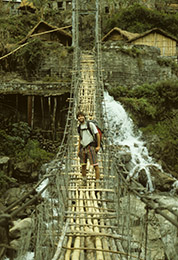
I was a chem major, class of 1989, and a Bates Aeronautics alum. During my senior year, flying was a serious interest. My Watson project was researching the role of small-plane aviation in Australia and Europe, with some adventures in Asia thrown in for good measure as I took the long road westward from Oceania to Spain.
In the fall winter of ’89/90, I spent four months in Australia and had the opportunity to fly with the Air Ambulance of New South Wales, the Royal Flying Doctors Service, gliders in Alice Springs and a helicopter to collect crocodile eggs in Darwin. From there I traveled in southeast Asia, then spent some months trekking in Nepal. The idyllic picture of me on the bamboo suspension bridge was moments before a line of Nepalese goods-transporting yaks nearly knocked me into the river.
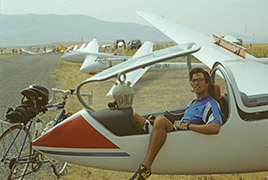
In the summer of 90 I learned to fly gliders (un-powered) aircraft in the central plains of Spain (there wasn’t much rain…). Pilots from around the world descended on a small airfield near Segovia to learn the craft of gliding on thermals, mountain winds, and waves. I slept for two months in a small tent space underneath the tow pilot’s pop up camper. (At left is) a slightly irreverent picture with the glider I flew and my trusty bike that I cycled across Spain with.
Graduate school, start-ups, and life in general after the Watson year left no time for my interest in aviation which stayed grounded until this year when I re-started flight lessons in spite of my busy work schedule with Snapchat (Snap Inc).
Sugi Sorensen ’87: Custom Bicycle Building & Racing
Custom Bicycle Building and Racing
France, Italy, USSR
David Somers ’87: Vegetarian Lifestyles & Ideals
Vegetarian Lifestyles and Ideals
Nepal, England, India
Fall 2018 interview for Harvey Mudd College Magazine (fall/winter issue)
Tell me a little about your experience.
As I headed into my senior year at Mudd, I realized that I had major conflict between my personal ethics and my career goals. I was a strict vegetarian, for ethical reasons. However, my scientific interests were driving me toward the field of neuroscience, which at the time was heavily focused on invasive experiments on animals. In high school, I had developed a significant interest in the mind, which led to consideration of the moral obligations to other minds, which led me to become a vegetarian. This same interest in the mind eventually led me to the field of neuroscience. However, the study of the brain seemed to imply killing animals in the name of science. Since vegetarianism and an interest in neuroscience came from essentially the same place for me, I felt very stuck and uncertain about how to move forward. It seemed to me that my vegetarian ethics logically led to veganism, but 30+ years ago, veganism was pretty rare, even in California. Veganism was considered to be an unsustainable, fringe lifestyle by most Americans, including me. At the same time, I felt that I should look to pursue a PhD in neuroscience, but had no idea how I might do this without compromising my vegetarian ethics.
My Watson proposal was to meet with other groups of people who also had a conflict between some form of vegetarian ideals and some other fundamental aspect of their lives. I hoped to gain insights from these observations that would help me to find a path forward in my own life. My proposal stated that I would meet and live among vegans in England, sherpas in Nepal, and vegetarians in India. The Sherpa people of Nepal are Tibetan Buddhists by faith and do not kill animals; however, their villages and culture exist at high elevation where potatoes, barley and few other crops thrive. In order to survive, they need to eat meat and they do, but only when someone else kills the animals. In India, I hoped to experience a majority vegetarian culture, as my vegetarian experience had been a rather isolated one. When I became a vegetarian I didn’t know anyone else who was a vegetarian. Even when I first came to Mudd, there were no regular vegetarian meals on campus; I had to fight to get Mudd to add regular vegetarian meals to the dining hall plan. What would it be like to live in a world in which vegetarianism is the norm?
I was able to do all that I proposed and more. In England, a kindly vegan took me under his wing and showed me that veganism was not only sustainable, but also relatively easy. With veganism demystified, I became a vegan. Visits with a scientific ethics group helped me to see that there could be branches of neuroscience that would serve as alternatives to animal experiments. Perhaps I could do interesting science without violating my personal ethics. From that experience, I decided to pursue a PhD in computational neuroscience and/or cognitive science. I was surprised to learn that the Sherpa people saw no moral conflict in their lives. Someone else killed the water buffalo. They ate it. No problem. I found their views to be an interesting parallel to the view of many Americans who regularly eat meat, but would never wish to kill an animal. The experiences in India also gave me useful insights.
What location, activity or person(s) were most memorable?
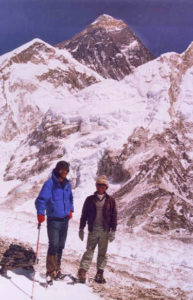
The people that I met were wonderful everywhere. The five weeks that I spent trekking in the Himalayas to visit sherpa villages in the Solu-Khumbu region around Mt. Everest were amazing. I also have a lot of memories of unicycling around Kathmandu for the two months I lived there trying to learn the language. India was a surprise every day. Sometimes good—like turning a corner to find an elephant moving toward you to bless me on my forehead with its trunk. Sometimes bad—incomprehensible poverty in many forms. India was often exhausting, but always amazing. By the time I returned home, between the Watson and another opportunity, I had also traveled through dozens of other countries, each leaving their own memories.
Looking back today from our fully connected internet world, I’m amazed how much bigger and distant the world seemed then. I spent five weeks traveling by foot everyday from village to village and only twice encountered electricity. Before I departed the U.S., I had written an actual paper letter to a contact in Kathmandu who had promised to arrange language training. I never got a response, but traveled there anyway. When I arrived in Kathmandu five months later, I found my own letter still sitting in the general mail bin, aka ‘poste restante,’ and only then did I realize that I was on my own. Today, you can blog and live stream video from Mt Everest Basecamp. Back then, I had to hike out from basecamp for days and then hope that nothing bad would happen to my exposed film before I flew home many months later. The past sometimes feels like an impossible fiction.
What are you doing now?
I am a cognitive neuroscientist, and I continue to be a vegan 30+ years after my Watson Fellowship. I’m a professor and department chair in Psychological & Brain Sciences at Boston University. My research lab uses non-invasive functional magnetic resonance imaging to examine attention, perception and working memory mechanisms in the human brain. My lab is funded by research grants from the National Institutes of Health and from the National Science Foundation. I guess it all kind of worked out.
How did your Watson project impact your life and/or career?
There is simply no way that I’m where I am today without the Watson Fellowship. I suspect that I may never have become either a neuroscientist or a vegan without the Watson. That is, without the Watson Fellowship, my life would be almost unimaginably different than it is today.
Clarence Wang ’84: Circus Families
Circus Families
United Kingdom, West Germany
Fall 2018 interview for Harvey Mudd College Magazine (fall/winter issue)
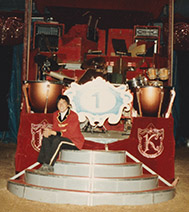
Why circus families?
I was always in performing arts in high school and in undergraduate. I was pretty much the only one in my family doing that—i’m the middle of five kids—so I was curious about what it is that differentiates a kid that wants to do that. I thought, what’s a proposal for the Watson that would involve traveling and performing arts, and that’s how I came up with the proposal.
Tell me a little about your experience.
I traveled through Switzerland, France, and England hanging around big and small circuses to see what the life was like, especially for kids growing up in the traveling/performing environment. I bought a VW camper bus so I could stay close to the troupes. I was allowed to travel on part of the tour of Circus Knie, Switzerland’s largest and oldest touring circus.
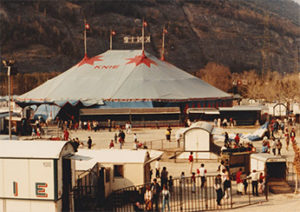
I arrived in late September but Circus Knie was on the tail end of their tour and introduced myself. They said come back in the spring. So I spent the intervening time in France for the winter where some traveling circuses go and set up more of a permanent place, so that gave me something to do during the winter. Then I went back in the spring and began to tour with them, from March until July.
What location, activity or person(s) were most memorable?
They gave me a uniform (scarlet jacket with black velvet lapels and cuffs, gold buttons and braid) and let me help as a requisiteur, or stage hand, moving things in and out of the ring between acts. I fell in love with a circus employee (a girl who helped with the performing horses). She lived in a circus wagon next to the giraffe! She married a juggler after I left.
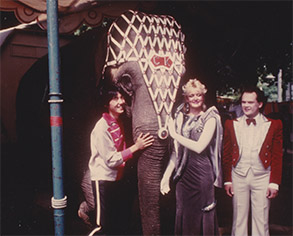
What are you doing now?
I manage a scientific computing group in R&D in Sanofi, a global pharmaceutical company.
How did your Watson project impact your life and/or career?
For someone in a technical-focused college to have an opportunity like that where the odds were pretty good to get something like the Watson, that was unbelievably transforming for me. It was mostly about the aspects of being on your own and learning to roll with the punches. That’s something that a lot of kids these days don’t really get that exposure, that opportunity to explore.
A few significant learnings from my experience have very strongly influenced my approach to work, and my outlook on life.
- Be flexible and adaptable. My planning didn’t quite work out the way I expected, but new opportunities always appeared.
- Be open to new opportunities, and to new people. There’s always some risk, don’t be foolish, but the possibility of different positive outcomes so often outweighs the risks.
- Enjoy life, take pleasure in the journey.
James Widergren ’82: Effects of Electrification on Rural Asian Societies
The Effects of Electrification on Rural Asian Societies
Philippines, Nepal, Indonesia
Fall 2018 interview for Harvey Mudd College Magazine (fall/winter issue)
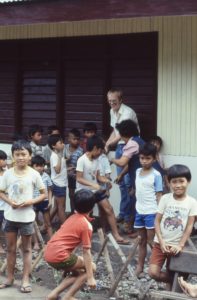
I graduated from Harvey Mudd in 1981 in engineering and, at that time, Mudd had a fifth-year master’s in engineering program, so I participated in that and received my master’s from Mudd in 1982. As it was a five-year program, the Watson Foundation let me apply for the program after my master’s (usually only after a bachelor’s degree.)
I was interested in the introduction on new technologies into developing nations particularly Asia. I was familiar with Asia having spent a year there between High School and before attending Mudd.
Initially the project focus was on the effects of electrification on rural communities, but it grew to encompass appropriate and sustainable technologies in rural Asia. I visited the Philippines, China, Indonesia and Nepal.
Most memorable were the efforts individuals and groups were making in Nepal to introduce micro-hydro electric plants and solar cookers to slow the spread of deforestation. Most surprising was how much foreign aid money is wasted on inappropriate technologies: inappropriate due to lack of cultural or economic conditions. Infrastructure and equipment does not good if there is no money to train people in its use, operate or maintain it.
I am the CEO and president of the Orgentec Group, a global medical diagnostics company based in Mainz, Germany. We focus on developing tests for infectious and auto-immune diseases and distribute these tests to labs and hospitals around the world. I am also very active at the Keck Graduate Institute for Applied Life Sciences (one of the Claremont Colleges) where I will be taking over as the Chairman of the Board of Trustees in January
The Watson experience solidified my interest in the world at large. I have been involved in international health care for most of my career. I travel extensively for work and pleasure having been to around 100 countries and all continents. The Watson instilled in me a sensitivity towards the differing needs and availability of health care resources around the world and the reality that “one size does not fit all.”
David Abe ’81: Folk Fiddling
Folk Fiddling
Ireland, British Isles
Fall 2018 interview for Harvey Mudd College Magazine (fall/winter issue)
Tell me a little about your experience.
I spent my Watson year in the Republic of Ireland and Northern Ireland. I fell in love with Irish traditional music in high school and was interested in learning more about the music and the culture it developed in, expanding my repertoire of tunes, and improving my fiddle playing. I was hoping to develop an authentically Irish “sound” to my playing. Also, as Irish music is rich in regional styles, I wanted to understand their nuances and how they came about. I spent some time in the music archives at University College Dublin, Comhaltas Ceoltoiri Eireann (the Society of the Musicians of Ireland), and Raidio Telefis Eireann (the Irish national broadcasting agency) but most of my time was spent traveling and playing music (mostly in pubs), trying to absorb the music through total immersion. I was fortunate to have encountered an incredibly welcoming community of musicians and made friends with whom I remain close today.
What location, activity, or person(s) were most memorable?
There are so many great memories that it is hard to choose. I spent many memorable hours playing music at the Conradh na Gaeilge in Dublin. A chance encounter steered me to the Conradh when I first got to Dublin. In the early 80’s, the Conradh had informal Irish music sessions in the lounge bar in the basement. When I first went there, I didn’t realize that it was the headquarters of the Gaelic League, a social and cultural organization dedicated to promoting the Irish language. Not surprisingly, it was non-English speaking – only Irish spoken on the premises. Despite having no Irish, my Watson credentials got me in the door and I spent the next year having the privilege of playing tunes with some of the best traditional musicians in Ireland. Many of the musicians were in their early 20’s as I was and we shared a common obsession with the music and learning as many tunes as possible. At the Conradh, I met and became close friends with Frankie Kennedy (flute) and Mairead Ni Mhaonaigh (fiddle) who, at the time, were primary school teachers but would go on to found Altan, one of the most popular bands in Irish traditional music today. Through them (and others), I developed a lasting passion for the northern style of fiddle music.
The friendships I made during my Watson year have proved to be lasting ones. We’ve grown up together, seen each other get married, have kids, and now grandkids – all while playing our share of tunes along the way. Since 1982, my wife and I have visited Ireland every 3-4 years and a big highlight is reconnecting with old friends.
What are you doing now?
I got a PhD in electronics engineering (electrophysics) from the University of Maryland, College Park and am currently a branch head at the Naval Research Laboratory in Washington, DC, where I supervise about 30 scientists and engineers doing basic and applied research in solid-state and vacuum electronics.
How did your Watson project impact your life and/or career?
I certainly know more tunes now and I’d like to think that my fiddle playing got better – although I’m still learning and trying! My Watson year really impressed upon me the power of music to transcend borders and cultures. It connected me with a global community of musicians and friends, opening the door to some great experiences.
L. Woo ’77: Study & Performance of the Bass Trombone
Study and Performance of the Bass Trombone
United Kingdom
Fall 2018 interview for Harvey Mudd College Magazine (fall/winter issue)
I was truly honored to be the inaugural Thomas J. Watson Fellow from HMC. I believe my selection had extremely persuasive support from Professor J. A. Campbell. As a chemistry major, I had a strong interest in music and played trombone in the Claremont Colleges’ orchestra. My Watson “wanderjahr” allowed me develop a more robust connection to my music activities. In particular, I was able to delve into the early trombone (the “sackbut”) in Renaissance music, its evolution, and manifestation in its current form. The majority of my time was spent in London, under the mentorship of Mr. Eric Crees, the second principle trombonist for the London Symphonic Orchestra.
I recently retired as a professor of chemistry and associate chair from Iowa State University. My Watson fellowship not only led to fulfilling a dream, but provided the personal growth and self-reliance to succeed in a faculty position involving teaching and research. I have always considered my Watson Fellowship as my first successful grant! Because of my Watson experience, I encourage undergraduate and graduate students to broaden their interests as a means of enriching their lives. I can’t thank HMC and the Thomas J. Watson Foundation enough for providing such a wonderful and rewarding opportunity.